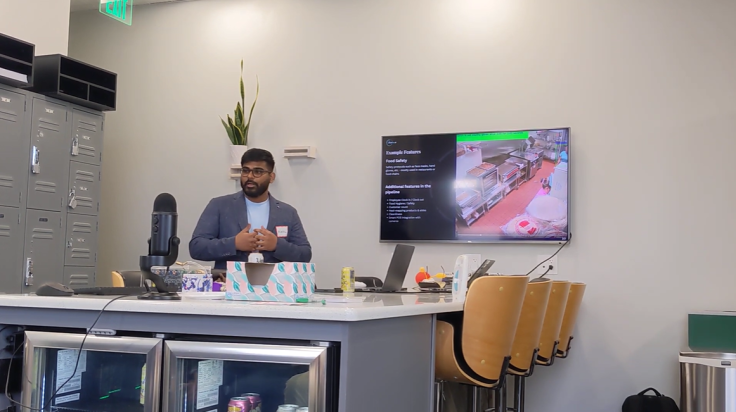Man Held Up At Gun Point Twice Starts AI-Enabled Security System With Paying Customers Within A Year
MokSa.ai gains 70 customers, $240k ARR in a year

In just one year, Nikhil Teja Kolli's startup, MokSa.ai, will make waves in the security industry. The company's AI-powered security cameras are helping businesses fight theft and fraud, and they've already amassed over 70 customers, generating £194443.20 ($240,000) in annual recurring revenue (ARR).
While working a night shift at a convenience store on the edge of the Ozarks during his college days in Kansas, Nikhil Teja Kolli faced a terrifying situation. A man lingered inside until the other customers cleared out, then approached the counter with a gun pointed at Kolli. The gunman swiped the cash and left, leaving Kolli frozen in a wave of helplessness.
Shaken but undeterred, eight months later, Nikhil would face another armed robbery. Little did he know then, these traumatic experiences would plant the seeds for a future venture – a business dedicated to combating theft.
MokSa.ai, the startup led by Nikhil Kolli, helps businesses safeguard their assets and prevent employee misconduct. Leveraging AI-powered security cameras, the company launched recently after operating in stealth mode.
The Problem with Traditional Surveillance: Why Businesses Need AI
Companies have been sparing no effort to take advantage of AI lately. For example, a new survey shows 40 per cent of companies will use the technology to interview job applicants in the future. Some studies suggest a possible future where businesses leverage AI to streamline tasks, potentially leading to a shift towards shorter workweeks for employees.
This trend also extends to security solutions, with a growing number of businesses seeking AI-powered options to safeguard their assets.
MokSa.ai's financial performance is particularly noteworthy for a startup in its early stages. The company has already achieved impressive traction, boasting over 70 paying customers nationwide across gas stations, liquor stores, and bodegas.
This translates to £16203.60 ($20,000) in monthly recurring revenue, a remarkable feat for a young startup. This ideal blend of machine learning and early profitability has secured MokSa.ai £1.22 million ($1.5 million) in funding.
According to a Business Insider report, the March round was led by Array Ventures, with participation from notable figures like Jay Farner, former CEO of Quicken Loans, and The Fund Midwest.
Monitoring security footage manually can prove to be arduous for business owners as it requires them to spend a lot of time sifting through recordings. That's where MokSa.ai's software comes into the picture.
The software leverages computer vision to automate tasks traditionally handled by human security personnel. The software installed on existing security cameras can detect activities like shoplifting (think someone concealing a six-pack of beer) or employee theft (such as a cashier giving away merchandise).
The system sends real-time notifications with a clip of the incident to the customer dashboard, potentially saving business owners hours manually reviewing footage.
Additionally, to further enhance the accuracy of its AI models, MokSa.ai also employs data labelling. This involves having human annotators, often college interns in India, meticulously review video footage and categorise specific actions or objects within the frames.
Kolli emphasised this continuous improvement: "As we sit and speak, there is new data coming in and these models are getting better." This focus on ongoing development resonates with Shruti Gandhi, the founder and sole general partner at Array Ventures. According to Gandhi, a key differentiator for MokSa.ai is its customised models specifically designed for this use case.
"The data sets they have gathered in the last two years of being a services company allowed them to deploy trained models in customers from their first week of onboarding," she said.
"That is not possible today with a lot of business intelligence companies because most think they're going to get better once they have customer data. So the reason some companies will win over others in the same category is their access to unique, differentiated data."
MokSa.ai's software is designed to be agnostic to specific camera brands, making it compatible with a wide range of internet-connected security cameras. This flexibility positions them as a universal solution in the surveillance market.
To cater to businesses that might need to have existing compatible cameras, MokSa.ai also offers a bundled package. This includes the necessary security cameras and software installation in exchange for a multi-year subscription.
While customers can choose to receive calls from an operator when an event is detected, contacting law enforcement remains the business owner's responsibility. "We are offering a surveillance audit platform," he said. "So it's up to the customer to understand what they want to do with that information we provide."
© Copyright IBTimes 2024. All rights reserved.






